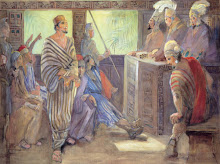Jesus mastered the art of question asking.
He knew, in every situation, the very hearts of His listeners, and He knew what question would get to the heart and mind of those He most dearly wanted to touch.
Take, for example, the account of His conversation with His disciples on the coast of Caesarea Philippi:
"Whom do men say that I the Son of man am?"
This question probably seemed harmless enough to those friends of His. He's curious about what people think about Him. That's a pretty natural thing for us all, isn't it? If we are gaining in popularity in some sphere, we want to know how we are being received among the crowds.
So His disciples answer, "Some say that thou art John the Baptist: some, Elias; and others, Jeremias, or one of the prophets."
Now, honestly here people, these sentiments were not the only ones being offered by the crowds who saw and heard Jesus. Some called Him a lunatic; some said He was a false prophet; still others insisted He was possessed by the devil. But His disciples don't want to tell him these things, they want to be positive here, so they mention all the prophetic people that He is being equated with.
The conversation is over, right? Jesus' curiosity has been satisfied.
No.
"He saith unto them, But whom say ye that I am?"
The conversation has left the objective realm of observation and has entered that most telling realm of subjectivity.
This question sounds familiar to another that He asked a group of self-righteous people, "What think ye of Christ, whose Son is he?"
Jesus was not concerned with satisfying a mere curiosity here. He wasn't interested in casual theological discussion. He wanted His pupils to know what was in their hearts--He already did, as mentioned above, but they probably did not. They weren't self-aware when it came to this. His disciples had one response, the other crowd had quite a different one.
First the response of those who considered themselves to be well educated on the Messianic prophesies:
"[The Christ (or, the Messiah)] is the son of David."
Because, duh! David was that glorious king of United Israel, and the Christ will be the one do ascend as king again, and reign over Israel once more. He is a descendant of David, and will hearken back to those glory days.
But the simple fisherman, Simon Peter, had quite a different response. This one didn't necessarily come from the canon (at least the popular canon anyway):
"Thou art the Christ, the Son of the living God."
Jesus is well pleased with this answer. Not because it validated Him at all. Not because it "was the answer He was looking for," like in so many Sunday School and seminary classes in the Church. But because this was what He wanted Peter to learn from the Spirit of revelation. Jesus knew that in asking this question His Father could work on the hearts of His disciples and they could learn something that they didn't know, but they would learn it in a way that would be lasting and powerful, because it would come from within themselves.
Simon Peter had found out who his Master really was. Whose Son is Christ? The Living God's.
Now, what questions is the Lord asking you today?
Thursday, January 31, 2008
Subscribe to:
Post Comments (Atom)

No comments:
Post a Comment